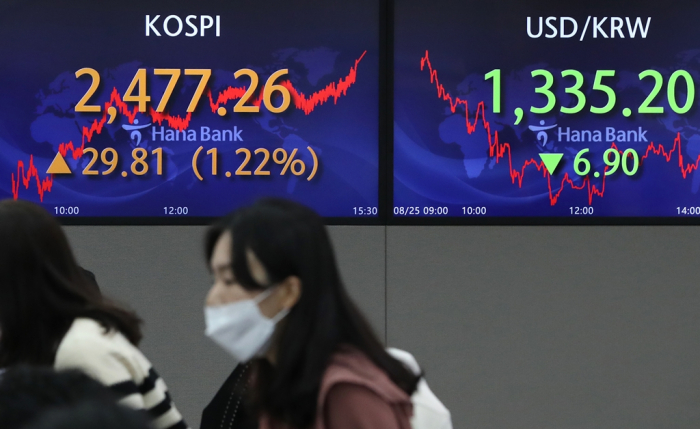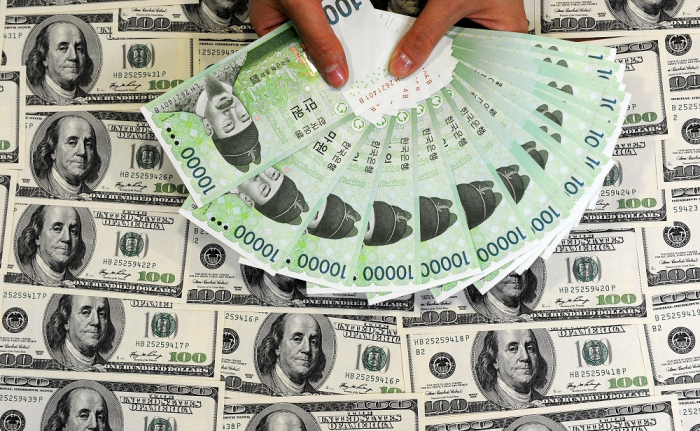Korean stock market
Foreign stock buying on weaker won: Bucking the trend?
In dollar terms, the Kospi index is undervalued, giving room for more foreign buying, analysts say
By Aug 25, 2022 (Gmt+09:00)
3
Min read
Most Read
Hankook Tire buys $1 bn Hanon Systems stake from Hahn & Co.


S.Korea's LS Materials set to boost earnings ahead of IPO process


NPS to hike risky asset purchases under simplified allocation system


Aman, Rosewood, Banyan, IHG rush to open luxury hotels in Seoul


Osstem to buy BrazilŌĆÖs No. 3 dental implant maker Implacil



When a countryŌĆÖs currency weakens, foreign investors flee the local markets as a softer foreign-exchange rate usually means fragile economic fundamentals.
However, foreignersŌĆÖ trading pattern in South KoreaŌĆÖs stock market over the past couple of months tells a different story.
According to the Korea Exchange on Thursday, foreign investors have bought a net 5.07 trillion won ($3.8 billion) worth of shares on the main Kospi bourse since the start of July.
It is the first time since the final two months of 2021 that foreigners posted net purchases for two consecutive months.
The strong foreign buying comes as the Korean won has weakened to its lowest level since the 2008-09 global financial crisis.
The local currency hit an intraday low of 1,345 against the greenback on Thursday, weakening from 1,298 in early July.
Given the softening won, foreignersŌĆÖ heavy buying of Korean stocks defies conventional wisdom.

UNDERVALUED IN DOLLAR TERMS
Market pundits say the Korean stock market is undervalued when viewed in dollar terms.
The benchmark Kospi index closed up 1.2% at 2,477.26 on Thursday. But when converted into dollar terms, the index is hovering around the 2,100-2,200 range ŌĆō similar to the level seen in December 2019, when the stock market was in the doldrums.
During the 2008-09 financial crisis, the dollar-converted Kospi moved below the benchmark index in won terms by 16 percentage points. The following year, foreigners strongly bought into Korean stocks, posting 32.39 trillion won in net buying. The Kospi index gained 50% on the year.
Data showed foreignersŌĆÖ Korean stockholdings have plunged to 27%, their lowest level in nearly 13 years, from 32% early last year, meaning increasing room for more purchases as soon as the foreign exchange rates stabilize.
ŌĆ£Money is flowing out of equity funds in emerging markets worldwide. But data shows foreigners are buying Korean stocks. That shows the attractiveness of the Korean market,ŌĆØ said Yuanta Securities analyst Kim Hu-jung.

WINDFALL GAINS FROM US-CHINA CONFLICT
Some analysts said Korea stands to gain from the growing conflict between its two largest trading partners, the US and China.
"The US Inflation Reduction Act (IRA) excludes materials and parts produced in China, so Korean companies that can replace them are getting attention,ŌĆØ said Cape Investment & Securities strategist Na Jeong-hwan.
Among the top picks by foreign investors on the main Korean bourse are chipmakers and battery manufacturers such as Samsung Electronics Co., SK Hynix Inc., LG Energy Solution Ltd. and Samsung SDI Co.
On Thursday, the Bank of Korea raised its key interest rate by a quarter percentage point to 2.5%.
The latest interest rate hike will remove the rate differential between South Korea and the US, discouraging foreign investors from flocking to the safe haven.
The recent decline in the Korean currencyŌĆÖs value, however, is posing a challenge to Asia's fourth-largest economy as soaring raw material prices boost import costs for local manufacturers, hurting their profitability.
Some analysts warn that foreigners wonŌĆÖt continue their buying streak unless the dollar-won exchange rate stabilizes.
ŌĆ£ForeignersŌĆÖ strong buying in recent weeks could be just short covering to pay off short-sold stocks earlier,ŌĆØ said a market analyst.
Write to Hyung-gyo Seo and Sung-Mi Shim at seogyo@hankyung.com
In-Soo Nam edited this article.
More to Read
-
 Central bankBOK delivers fourth straight rate hike as inflation persists
Central bankBOK delivers fourth straight rate hike as inflation persistsAug 25, 2022 (Gmt+09:00)
3 Min read -
 MarketsSell Korea intensifies as foreigners dump bonds for 1st time in 18 months
MarketsSell Korea intensifies as foreigners dump bonds for 1st time in 18 monthsJul 11, 2022 (Gmt+09:00)
3 Min read -
 Korean stock marketForeign ownership of S.Korean stocks at 13-year low
Korean stock marketForeign ownership of S.Korean stocks at 13-year lowJun 21, 2022 (Gmt+09:00)
3 Min read -
 EconomyWeakening won: A double-edged sword for the Korean economy
EconomyWeakening won: A double-edged sword for the Korean economyMay 15, 2022 (Gmt+09:00)
4 Min read -
 Korean stock marketSamsung Electronics shares rebound as foreigners turn net buyers
Korean stock marketSamsung Electronics shares rebound as foreigners turn net buyersApr 29, 2022 (Gmt+09:00)
2 Min read
Comment 0
LOG IN


